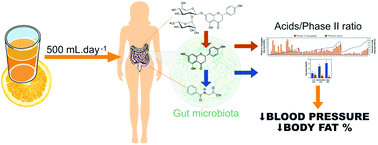Blood pressure and body fat % reduction is mainly related to flavanone phase II conjugates and minor extension by phenolic acid after long-term intake of orange juice†
Abstract
Hesperidin and narirutin are the major flavanones present in orange juice, and they are associated with a reduction in risk of cardiometabolic disease. However, there is heterogeneity in their biological responses, which is partly due to the large interindividual variation in these flavonoids’ bioavailability. We investigated the relation between interindividual variability in the excretion of phase II conjugates and gut-derived phenolic acids, and cardiometabolic biomarkers response. Seventy-four subjects, both men and women, were included in a single-arm study. Over the 60 days, volunteers consumed 500 mL of orange juice daily. All measurements and blood collections were performed before and after the intervention period. Moreover, 24 h urine collection was performed after first consumption. Individuals were stratified according to the excretion of phase II conjugates and, for the first time, according to phenolic acids in high, medium, and low excretors. Furthermore, for the first time, the ratio between phenolic acids and flavanones-phase II conjugates has shown groups with different metabolization patterns. Groups with a low or intermediate ratio, corresponding to a higher amount of phase II conjugates excreted, showed a significant reduction in body fat % and blood pressure. This finding suggests that these improvements could be associated in a major way to flavanones-phase II conjugates, as well as to phenolic acids and stratification of volunteers according to metabolite excretions could be a good strategy to better understand the effects of orange juice on metabolism and health.



 Please wait while we load your content...
Please wait while we load your content...